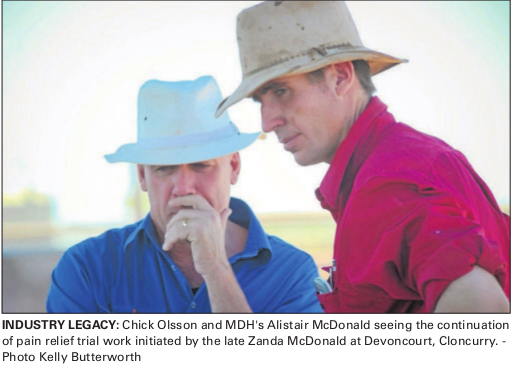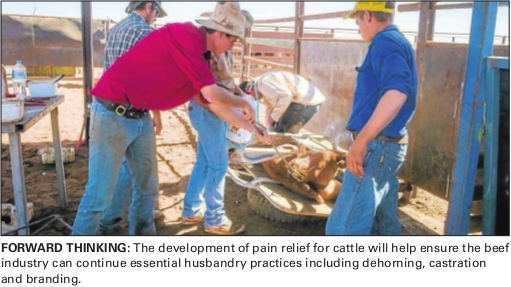Press Release
Zanda’s cattle pain relief vision on show
September 27, 2017
IT’S a matter of seeing is believing. A squirt of the blue gel from the purpose made applicator onto the wounds left by the dehorning, branding or, in the case of bull calves, castration, and the job is done.
But it’s the behaviour of those young calves almost immediately after leaping up from the branding cradle that is perhaps the most impressive. Despite having just undergone these invasive animal husbandry practices, only minutes later they stand with their mates appearing calm and relaxed.
There is no headshaking, no calves lying down, and no obvious distress. Most impressive is there is no visible bleeding. In fact, because of the barrier the blue gel creates across the entire wound, it is hard to even see the wound.
For major pastoral company MDH, the use of the Bayer pain relief product Trisolfen on its Cloncurry property, Devoncourt, is as an integral part of its husbandry practices at branding. Partly because it reduces the stress imposed on the young animals, partly because it helps guard against infection, and partly because it is part of bigger picture of ensuring that on-farm animal husbandry practices are inline with consumers expectations.

Mount Isa-based vet Ed Butterworth, North West Veterinary Clinic, who helps oversee the 170,000 head MDH herd is clearly impressed with the effectiveness of the now commercially available pain relief product.
“It’s easy to use and obviously effective,” Dr Butterworth said.
“The behaviour of the calves suggests they are obviously under less stress once the pain relief has been applied.”
Initially developed to provide pain relief for lambs after mulesing, Trisolfen is a pain relieving and wound healing formulation that has short term and long term analgesia, antiseptics, reduces blood loss and coats the wound. It costs between about a $1 and $1.50 to treat each animal. It is described as best suited to calves aged six to eight weeks and is designed to provide pain relief for 24 to 36 hours. Bayer, which manufactures Trisulfen under license from Animal Ethics, has formulated a thicker gel that has an 18 month shelf life.
Alistair McDonald said MDH was likely use Trisolfen on all of the more than 40,000 calves from next year, pending final registrations. “The benefits to the calves from Trisolfen are obvious and significant,” Mr McDonald said. “Since we started the trial work in 2012 we’ve been working out the best way to use the product. It really takes away the stress and the calves are looking for a drink within minutes.”
MDH uses Angus bulls as terminal sires over high grade Brahman females on Devoncourt. The majority of the cattle bred by MDH are fed through the company’s Wallumba Feedlot at Condamine.
Mark Phelps flew with Pilatus Australia, in recognition of the late Zanda McDonald, who helped initiate theTrisolfen trial work.
Why pain relief really matters

IT WAS borne from the recognition that the livestock industry needed to stay ahead of the game. A kitchen table conversation between forward thinking Cloncurry-based pastoralist, the late Zanda McDonald, and industry leader Chick Olsson more than 10 years ago questioned how the beef industry could ensure the continued use of essential husbandry practices including dehorning, castration and branding.
Disturbed by the ongoing and damaging campaign launched by US-based extreme animal rights group PETA on the wool industry and its use of mulesing, the pair recognised that the beef industry was potentially open to attack.
Regardless of how important the practices were ultimately to an animal’s long term welfare, conventional husbandry practices – particularly those that involved invasive surgery – could easily be misconstrued by activist groups campaigning to destroy consumer confidence in the $17 billion industry.
Part of the solution lay in providing pain relief that was both effective and able to be applied in difficult environment presented by busy and dusty cattle yards. Enter Trisolfen, a product developed by Animal Ethics, a company owned by Mr Olsson and other keen investors determined to counter PETA’s attack on Australian wool. The antiseptic gel now licensed to Bayer Trisolfen is a pain relieving and wound healing formulation that has short term and long term analgesia, antiseptics, reduces blood loss and coats the wound.
“When PETA started campaigning against mulesing, US retailers of Australian wool began dropping like flies,” Mr Olsson said. “The industry could fight PETA all it wanted and argue that mulesing was essential, but the reality was retailers were refusing to sell Australian wool and increasing numbers of consumers were refusing to buy Australian wool.
“Until the use of pain relief became widespread, PETA was winning and the only losers were Australian woolgrowers. Zanda could see a potentially similar problem emerging for the beef industry. We needed to be proactive and ensure the way we produce beef is in line with consumer expectations about how animals are treated.”
Further information
Medical Ethics:
Allan Giffard, Managing Director
Charles Olsson, Marketing Director
+61 419 362 286
FTI Consulting:
Brett Pollard, Victoria Foster Mitchell
+44 (0)20 3727 1000


